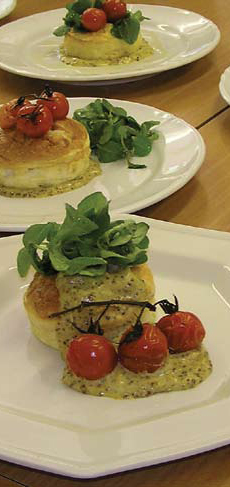




| Home | Features | Club Nights | Underwater Pics | Feedback | Non-Celebrity Diver | Events | 8 August 2025 |
| Blog | Archive | Medical FAQs | Competitions | Travel Offers | The Crew | Contact Us | MDC | LDC |

|

|
 
 |
 |
ISSUE 4 ARCHIVE - COOKING THE CATCHAndrew MaxwellTwice Baked Smoked Haddock Soufflé with Mustard CreamEvery time I sit down to write the latest article for "cooking the catch", I gather together all the notes, newspaper clippings and snippets of information from the previous few months that I have kept, and quite simply don't know where to begin. I have articles in front of me highlighting the fact that British waters are among the most polluted in the world; articles detailing the rubbish slick between Hawaii and Japan that is twice the size of the US, held there by ocean currents... Worst of all, a two page article in one of the most popular and bulky Sunday papers about a 400kg Thresher shark that was landed for its fins. The paper even published a recipe for shark fin soup. Did you know that shark fins are sold for around 50p per kilo?In December 2007, myself and a group of friends spent a week in Malta doing an Advanced Trimix course with London Diver's own agony aunt – Uncle Toomer. Those of you lucky enough to have experienced the wrecks in the waters there will be reading this drooling with jealousy. The diving there is stunning, if you like wrecks. However, in 5 days of diving, I can count the number of fish I saw on the fingers of one hand. This was not because of the depths to which we were diving. It was more closely linked to the 40,000 tonne industrial freezer ship that sits off the coast of Malta. We saw no fish, quite simply because there were no fish to see! Malta's annual quota for Tuna is 700 tonnes. It may only be a small outcrop in the Med, but with a population of 400,000, this quota does not stretch far among its residents and the hungry export market. However, the quota simply states that they are only allowed to land 700 tonnes. They can actually catch as much as they like, and they have been quick to realise that provided they freeze the fish off shore and never bring it to land, there is no limit to what they can sell on the export market. The freezer ship that I mentioned above – Korean. Oh and there is somewhere in the region of 3,000 tonnes of Tuna sitting in nets in the waters around the ship. No wonder there was nothing for us to see. |
 |
|
And so we come to this edition's recipe. I think I'll steer clear
of Tuna.
Haddock is a fish that is found readily around the world, but as with the Monkfish in the last edition of London Diver, it is one that requires a little thought. I have put this recipe in because I do actually want you all to think a little about the fish you buy. Rather than just going to the supermarket or fishmongers and buying whatever they have, please, please spend a little bit of time sourcing haddock that is caught from sustainable stocks. It is not hard to find – most retailers will be able to tell you where it is from and if they cannot, I'd advise that they are perhaps not the best people to be buying fish from. IngredientsTo serve 4:
|
 | |
Method:Brush 4 ramekins with melted butter and dust out with grated Parmesan cheese. Pre-heat the oven to gas mark 3, 160ºC.Poach the fish in the milk until just cooked, about 5 – 7 minutes. Cool slightly and flake the fish. Reserve the milk. Mix the butter and flour to a paste. Flake the fish removing any skin and bones. Place the milk over the heat and whisk in the flour and butter mixture until a thick sauce is formed. Add the egg yolks and Parmesan, season with salt and black pepper and carefully stir in the flaked haddock. Whisk the egg whites until stiff and fold into the fish mixture. Divide between the prepared ramekin dishes and place in a bain marie (A roasting tin half filled with boiling water.) Place this tin into the oven for 10 – 15 minutes. Allow the soufflés to cool slightly before removing from the ramekin moulds. Place on a baking sheet lined with silicone paper. To make the mustard cream: melt the butter in a small saucepan and sweat the shallots and garlic until just soft. Add the mustard and cream and boil to reduce slightly. To serve: place the soufflés in the oven for 10 minutes to heat through. Heat the mustard cream in a small saucepan. Place the soufflés on individual serving plates with a spoonful of mustard cream around. Toss the rocket and lambs lettuce in a little olive oil and season, arrange a little on each plate with some roasted tomatoes on the top. Serve at once. |
 | |
Previous article « Thailand Next article » Women in Diving Back to Issue 4 Index | ||